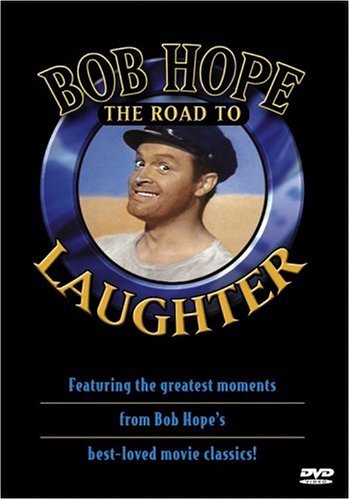0
0
0
0
0
0
0
0
0
or copy the link
Thanks for the memories! The career of Bob Hope is celebrated in this side-splitting tribute to “Old Ski Nose.” Along with an assortment of the greatest–and most hysterical–moments from his impressive filmography, the program also features interviews with Hope’s writers Larry Gelbart, Mort Lachman, Sherwood Schwartz, and Melville Shavelson. 98 min. Standard; Soundtrack: English; bonus footage; audio commentary.

Valuable Service Rendered To Cinemaphiles Through Documentary Chronicling The Many Aspects Of Bob Hope’s Career. Numerous clips (over 90!) from Bob Hope’s over a quarter century of popular feature film appearances highlight this well-made film that is heartily recommended to fans of the great comic actor, and who might enjoy a compendium of Hope’s cinema appearances, with material gathered from among his finest efforts, and intensified by knowledgable commentary from Leonard Maltin and from a quartet of Hope’s most creative writers throughout his lengthy performing career as an entertainer. Maltin provides a background for the Hope filmography, with informative narration in conjunction with several extended scenes from such comedic classics as the “Road” films (TO MOROCCO/SINGAPORE/UTOPIA/ZANZIBAR), along with THE BIG BROADCAST OF 1938, THE PALEFACE, MONSIEUR BEAUCAIRE, and other pictures that are marked by Hope’s perfection with timing, and benefiting as well from other players of a high order, personified here by the complete episode from BROADCAST wherein Bob and Shirley Ross introduce what became his theme: “Thanks for the Memory”. The four gag writers interviewed are Larry Gelbart, Mort Lachman, Sherwood Schwartz and Melville Shavelson and they furnish a multitude of insights into those specific elements that have made Hope one of the most accessible of all motion picture comedians, such as his talent at being able to incorporate audiences directly into scenes, in addition to his ongoing persona as a movie Everyman who desperately wishes to accomplish greater achievements than his ability can manage. During the course of this hour-long work, Hope’s skill with ad libbing, one shared with Bing Crosby, is stressed, as also is his versatility, having proved to be equally adept as a monologist as he is while functioning at physical comedy. A well-produced Hart Sharp DVD contains a 39 minute bonus segment of interview footage, not seen with the original American Public Television broadcast, with the mentioned writers, from whom a raft of perceptions comes tumbling. In addition to numerous personal anecdotes, Hope’s early background in vaudeville and radio is discussed, as is his innovative usage of current events injected into his radio show; his insistence upon brevity for gaglines; Paramount Pictures’ uncertainty as to how to utilize its popular property, eventually pairing him with Crosby; his potent ability to project a personality, assisted by his background as a dancer; and there is a great deal more. In sum, viewers will find this a consistently interesting and instructive film.
“You know you are getting old when the candles cost more than the cake.” — Bob Hope In the hour PBS documentary, BOB HOPE – THE ROAD TO LAUGHTER (2003), it would’ve been nice to find out from film historian Leonard Maltin why BEAU JAMES (1957), Hope’s last great picture, has never been on home video, but Maltin early-on sets the outside parameter of this career retrospective as the 1940s, a decade when Hope could do no wrong.In those years his radio show was in the Top Ten, Bob was a first rank film star, and during WWII he began a legendary association with the USO, traveling all over the world, often at great risk, to entertain military personnel.Within its limited scope, Maltin, plus Hope radio writers Mel Shavelson (1938-42), Sherwood Schwartz (1939-43), Mort Lachman (1947-48) and Larry Gelbart (1948-51), share screen time with extended excerpts from: (1948) (1946) (1942) (1947) (1940) (1946) (1943) (1949) (1941)We hear Bob sing “The Road To Morocco” (with Bing Crosby), the first version of “Thanks For the Memories” (with Shirley Ross) and a racetrack themed “Rock a Bye Baby” in the remake of LITTLE MISS MARKER (1934). Hope’s deftness with physical comedy is also on display, but always there’s that magnificent comic timing. In his prime there was no one better than Bob.You won’t find skeletons unearthed here, nor any scandals or controversy. Ultimately, this is a loving tribute to the man born Leslie Townes Hope. Bob made it to age 100 years plus two months, and we were all that much richer for such a long life.Includes 20 bonus segments with the above five men, for a running time of about 100 minutes.
Bob Hope fans will enjoy it This was bought for me a few years ago and our family has enjoyed it numerous times. Being a fan of Bob Hope, it was fun to relive some of his best moments from his movies. Now it they would only offer a similiar treatment of his USO shows.